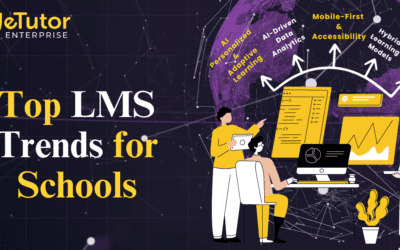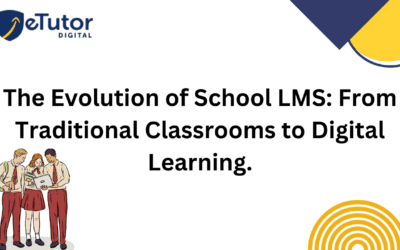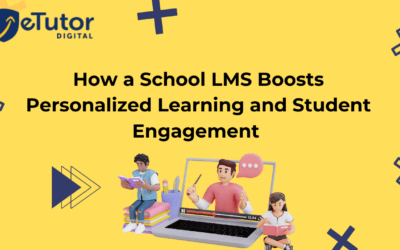Customizable Learning Management System for Schools in 2024
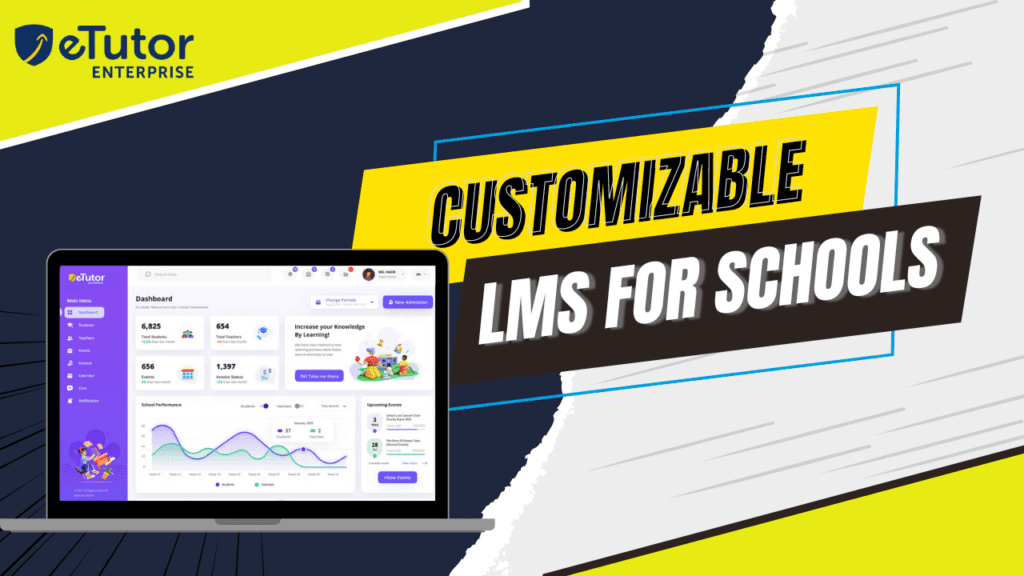
Table of contents
Introduction
What is a Learning Management System?
How do learning management systems work?
Who needs an LMS system?
Key LMS features:
Benefits of a learning management system:
Use cases for LMS e-learning:
Frequently Asked Questions
Introduction
The use of eLearning platforms has significantly increased during the past ten years.
Learning management systems (LMSs) currently govern the e-learning sector. One significant element that contributed to this was the increase in the prominence of on-demand content.
According to research and market data, the global LMS industry is anticipated to grow from $7.65 billion in 2016 to up to $40.36 billion by 2026, with a CAGR of 20.3%.
This is fantastic news for anyone considering engaging in a Learning management system.
Have you ever tried using the eTutor LMS?
Etutor LMS for schools is an innovative idea for tailored learning that motivates your students to support their academic success.
What is a Learning Management System?
LMS stands for Learning Management System. It is a software platform that aids in managing and delivering educational materials and information to students for instructors and organizations.
An LMS often supports developing, administering, and monitoring courses online and handling administrative functions like registration, enrolling, and assessment.
How do learning management systems work?
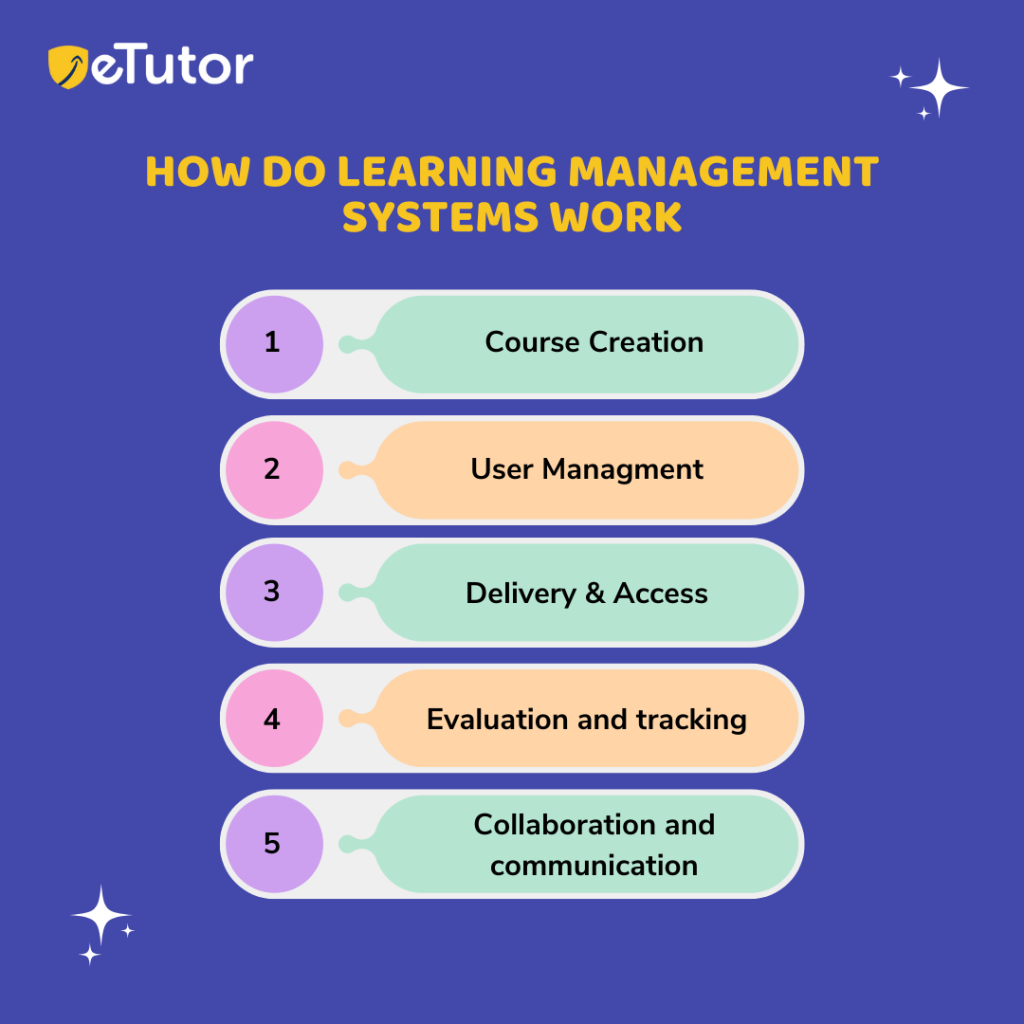
Learning management systems (LMS) provide instructors with a centralized platform to produce, distribute, and administer educational resources and information for students. The fundamental actions that an LMS must take to operate are listed below:
Course creation: With the LMS platform, educators can construct online courses by uploading course resources like lectures, quizzes, and videos. Calendars and conditions for course completion can also be established.
User management: Administrators may handle users on the LMS platform, including students, teachers, and other staff members. Access permissions and user roles can be modified to meet the company’s requirements.
Delivery and access: Students log in to a web-based system or use a mobile app to access the course contents through the LMS platform. Students with internet service can view course content online at their convenience, regardless of location.
Evaluation and tracking: The LMS system allows teachers to evaluate students’ progress and track how many courses content they have finished. In addition to analytics and monitoring tools for tracking student performance, this also contains tools for assessments and assignments.
Collaboration and communication:Both learners and teachers can benefit from a more involved and engaging online learning experience thanks to the collaboration and communication capabilities provided by the e-tutor.
Who needs an LMS system?
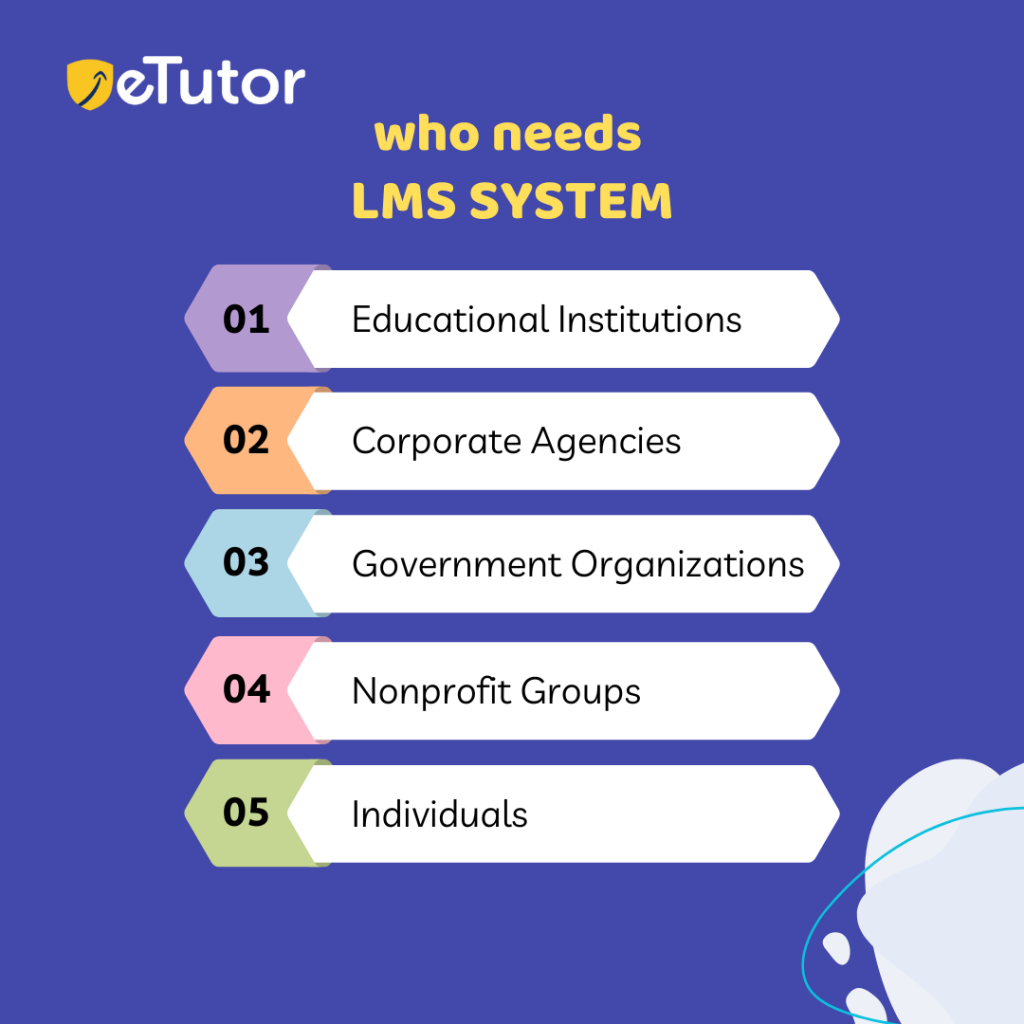
Individuals and organizations could use learning management systems (LMS) to organize and distribute instructional resources and material to learners. The following are some of the demographics that could gain from adopting an LMS:
Educational Institutions:Schools, colleges, and universities can use LMS systems to provide online courses, track student progress, and manage course materials.
Corporate Agencies:Companies can offer employee training and development programs using an LMS. This may involve leadership development, developing skills, and training programs.
Government organizations:Government organizations can utilize an LMS to offer public and staff training courses. These could include certification programs, professional development plans, and safety practices.
Nonprofit groups:Nonprofit groups can utilize a learning management system (LMS) to offer training and educational programs to their supporters or the general public. Community engagement, fundraisers, and advocacy education programs can all fall under this category.
Individuals:Individuals may obtain educational materials and undertake online courses using an LMS. These can include programs for self-enrichment, professional development, and continuous education.
Key LMS Features
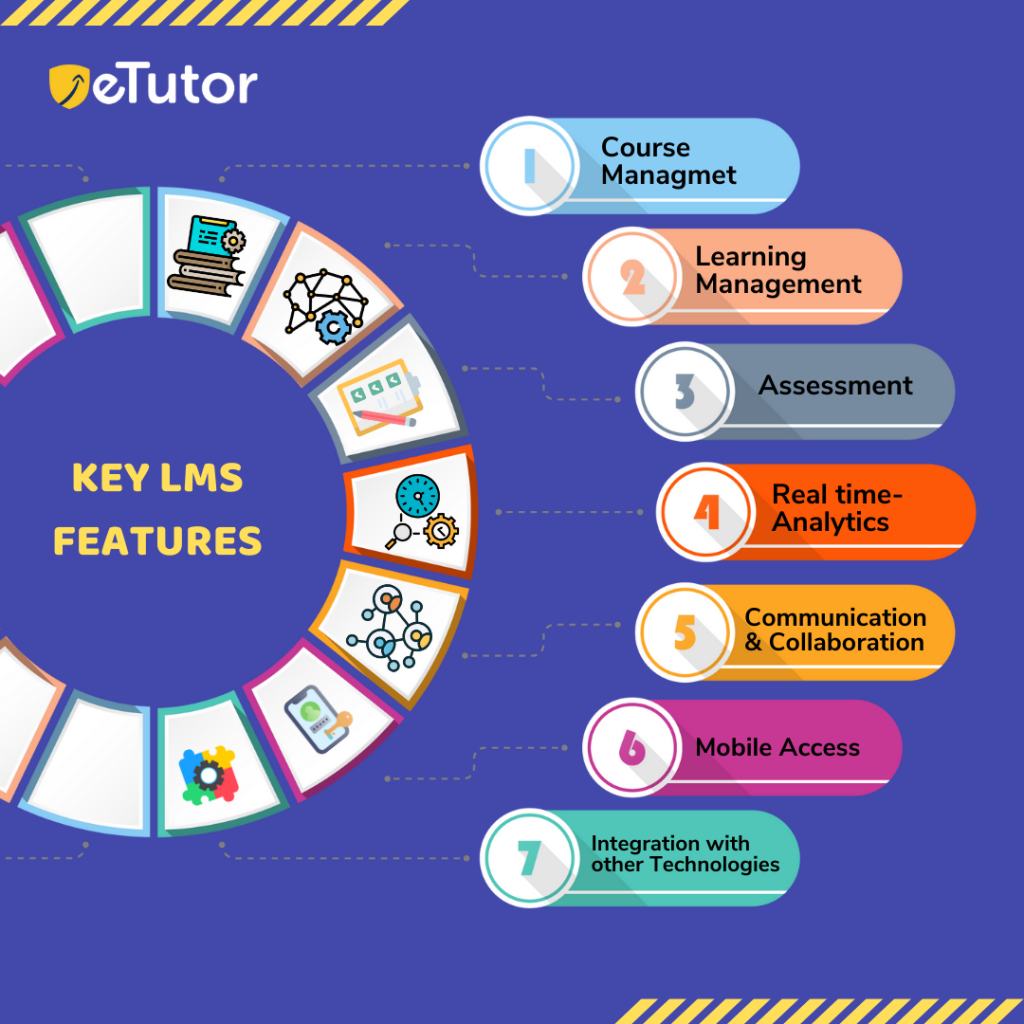
Our Etutor LMS platform offers various features such as:
Course Management: This function enables administrators to designate teachers or facilitators, upload course materials, and manage courses.
Learner Management:With this function, administrators can take care of learner profiles, sign up students for classes, and monitor their development.
Assessments:LMS systems frequently include facilities for creating and delivering examinations, quizzes, and assignments. They also allow teachers to mark homework and give students feedback.
Real-time analytics:LMS systems include statistics and analytics on student progress, course completion rates, and other indicators that administrators can use to monitor the success of their initiatives.
Communication and Collaboration:To promote communication and interaction between learners and teachers, LMS systems frequently incorporate communication and collaboration features, such as messaging, discussion boards, and video conferencing.
Mobile Access:Many LMS platforms provide mobile access, allowing students to view course materials and finish assignments on their mobile phones and tablets.
Integration with other technologies: LMS systems can connect to other products, including analytics programmes, video conferencing systems, and content creation tools.
Benefits of a learning management system:
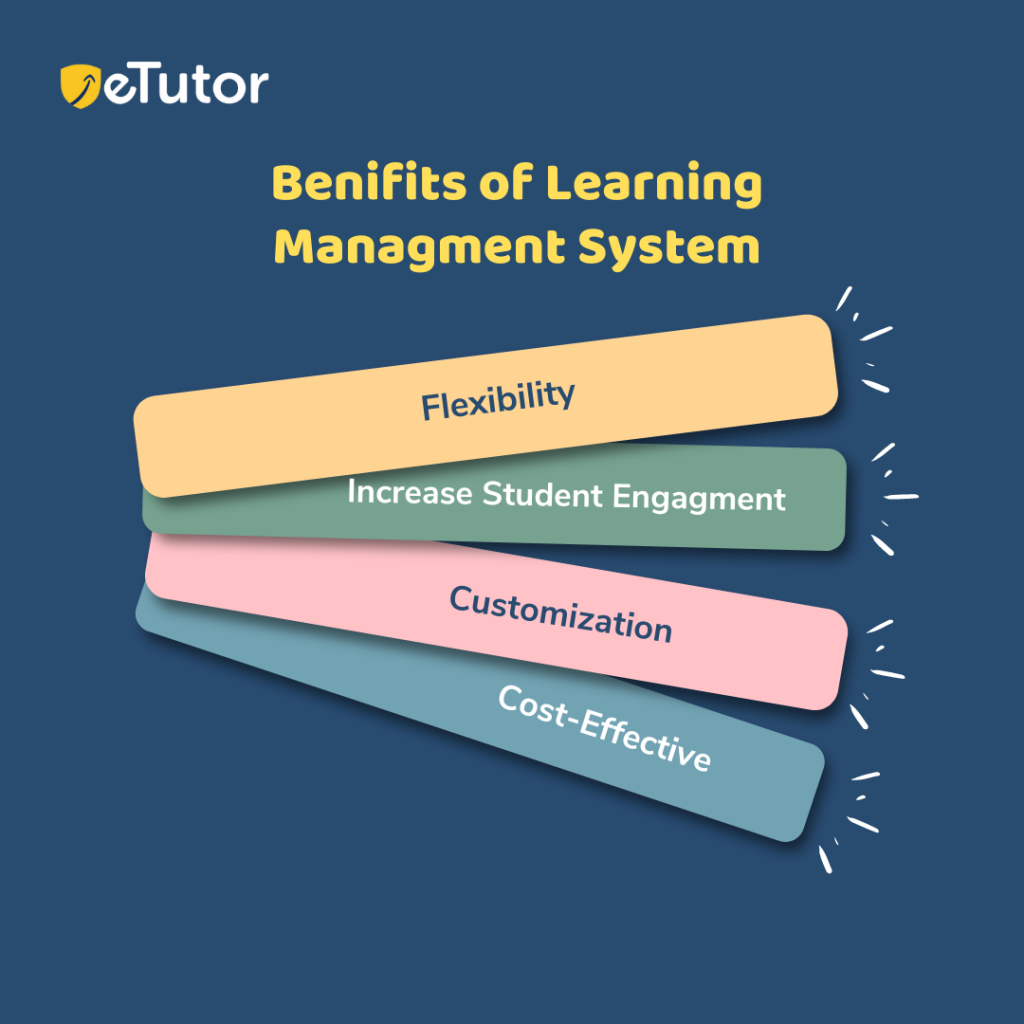
The following are some of the primary advantages of adopting an LMS:
A consolidated platform for managing course content, student data, and administrative chores is provided by an LMS for educators. Organizing and delivering course materials, monitoring student progress, and producing reports are all made simpler.
Flexibility: With an LMS for schools, students may work on assignments and access course materials at their speed from any location with an internet connection. This makes it simpler for students to manage their personal and academic obligations.
Increase student engagement: An LMS can help students become more engaged by offering multimedia-rich, interactive content like videos, quizzes, and simulations. Additionally, it offers resources for interaction and cooperation between students and teachers.
Customization: An LMS can be tailored to a company’s unique needs and specifications. This covers user roles, branding, and access rights.
Cost-effective: Offering instructional resources and training to sizable student populations can be accomplished affordably by using an LMS. Physical classrooms are no longer required, and travel and housing costs for students and teachers are decreased.
TIP: TRY eTutor
e-Tutor Learning management system is a software application for the administration, documentation, tracking, reporting, automation, and delivery of educational courses, training programs, materials or learning and development programs.
Use cases for LMS e-learning
Employee Learning
Employee training is indeed the use case that occurs most frequently. You must often train your workers if you work for an insurance agency that manufactures scooters. For example, you could be looking to impart new skills to present employees or train them on compliance.
With a firm LMS, your workers may study the material at their preferred pace without interfering with business operations. This allows you to prevent the disruptions that traditional learning causes.
Because LMS training needs less effort and resources than engaging qualified lecturers to present traditional seminars, it can help you lower the cost of staff training. Comprehensive monitoring and reporting tools can help you better understand your personnel’s progress.
Onboarding
You may speed up and automate onboarding a new employee using a business online educational management system. The remaining material can be studied at your convenience, but you must still welcome them personally and present them around the office.
The specifics of your corporate history or safety protocols are difficult for new employees to recollect. With a web-based orientation course, you could ensure employees always have helpful knowledge.
Continuously educate
An LMS could let you provide online students with on-demand seminars, technical schools, or other sorts of continuous learning. You may create unique courses, send out immediate updates, and monitor the success of people or organizations.
It allows you to deliver the best LMS experiences to our global audience. Whenever it relates to ongoing commerce training, an LMS might greatly impact your bottom line since it enables you to offer kids quick access to internet-based training resources, which boosts sign-ups.
Conclusion:
The best learning management system (LMS) simplifies building, launching, and managing courses. An eTutor LMS is made to fit your requirements, cost, and ability level if you’re managing student homework or offering self-paced online training.
FAQ’s:
Author: Saritha Reddy
Website: https://www.etutor.co
Recent Posts
- NTA-Based Hybrid Assessment Software for IIT-JEE Mains, Advanced & NEET
- eTutor Offline Exam Software for IIT-JEE, NEET, and Foundation with Student Performance Analytics
- NEET Test Generator for Academies & K-12 Schools
- How School ERP Software Maximizes Productivity and Minimizes Cost
- How Does ERP Software for Schools Help Educators?


